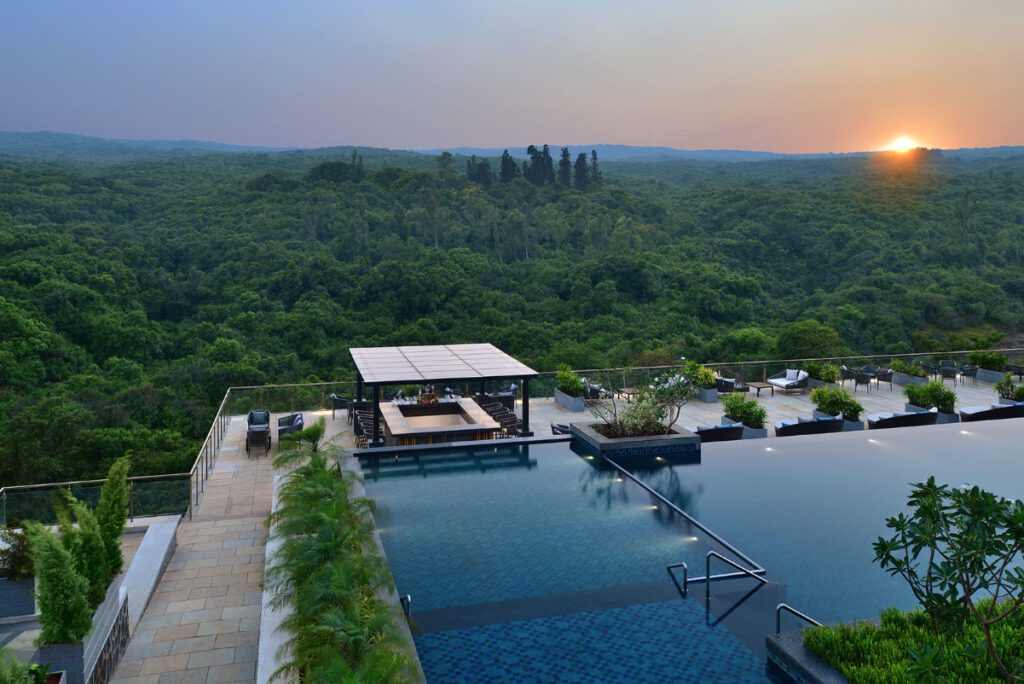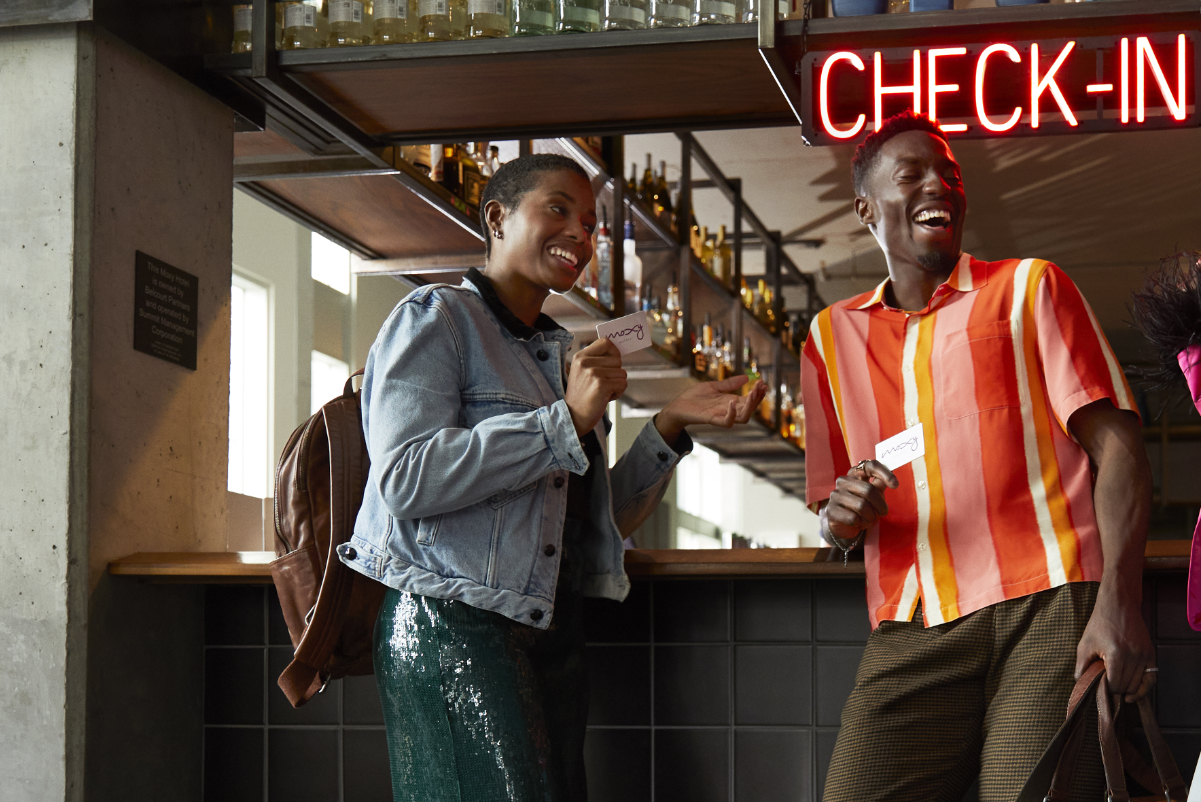Skift Take
Marriott's new ad campaign for its loyalty program doesn't explicitly mention online travel agencies. But the ad's gist is that you can find a hotel for any taste and budget on its app. Why book anywhere else?
Marriott International has long relied on its array of 30 brands to appeal to diverse mix of travelers. But the hotel giant increasingly would like consumers to believe its loyalty program gives them access to a surprising mix of lodging. Its marketers appear to hope that travelers will make Marriott’s mobile app their default place to book hotels.
The latest step in this multi-phase messaging campaign came on Monday when the hotel operator launched a TV ad to boost traveler recognition of its loyalty program, Marriott Bonvoy. The ad features a cover version of the B-52s hit “Roam Around the World” and showcases a few different Marriott brands — Westin (fitness!), Moxy (hipness!), and W (elegance!) — to illustrate the wide variety of its 8,000-property portfolio. The ad closes with the image of someone swiping through the Marriott Bonvoy app and finding every hotel brand they supposedly might ever need.
The ad launches this week on linear TV, primarily in sports programs, said Brian Povinelli, senior vice president and global head of marketing and brand. It will continue to run throughout the year and will roll out globally over the next few months, showcasing several portfolio-led and separate brand-led ads.
“We want the next generation of travelers to know that Marriott Bonvoy has accommodations that match their personality and lifestyle — from 30 hotel brands to homes and villas; all-inclusive resorts to apartments…and more,” Povinelli said.
Driving Direct
The ad’s implicit message is that Marriott Bonvoy is a better alternative than booking through online travel agencies. The ad is part of a long-running global tagline, “Where Can We Take You?“, which is a campaign that implicitly aims to make the loyalty program interface a default booking portal for travelers.
Executives may coyly say that the ad’s only message is “discover more through Marriott Bonvoy.” After all, the ad doesn’t explicitly call people to book explictly the way Hilton’s “Stop Clicking Around” campaign did years ago.
Yet the ad comes at a time when Marriott has seen membership in its loyalty program grow by a third in three years and after executives have touted the loyalty program as a relatively cheap form of customer acquisition.
Intriguingly, the ad’s language and visuals assume the viewer has already become a member of Marriott Bonvoy. There’s no pitch to sign up or get a co-branded card. Instead, the ad focuses on the message that the portfolio gives travelers access to any hotel they might need for any trip.
The closing image is of a customer finding every place they might want to stay by swiping through Marriott’s Bonvoy mobile app. Implicitly, if a consumer can get “over 30 hotels through Marriott Bonvoy,” they should “discover” they have only one place they really need to shop.
The ad blitz comes in the wake of IHG Hotels & Resorts (InterContinental Hotels Group) last year running its largest marketing campaign in a decade to build brand recognition for its loyalty program, IHG One Rewards. Its ongoing “Guest How You Guest” campaign emphasizes that its various hotels let guests of all varieties.
Loyalty as a Growth Engine
Marriott’s loyalty program enjoyed remarkable growth since its launch under the Marriott Bonvoy brand name in 2018, when it had 130 million members, to the end of last year, when it said it had 177 million members — or 36 percent more.
The company’s performance was on par with U.S.-based hotel companies. Marriott, Hilton, Hyatt, Wyndham, and Choice collectively had a 35 percent average growth in loyalty members since 2019, according to an analysis by CBRE Hotels Research this month.

Direct Bookings Driver
Last year Marriott reported record direct bookings. Direct reservations enable hotels to avoid the commissions of between 10 and 30 percent that online travel agencies often charge.
In 2022, Marriott boosted room nights booked via its digital channels by 27 percent and revenue generated from bookings via its direct channels by 41 percent. It didn’t disclose more financial details but said digital bookings were above the pre-pandemic level in early 2019. It said the number of users of its mobile app last year rose by 32 percent year-over-year and that the loyalty program was the main driver of that trend.
Marriott’s performance was in line with a broader trend.
“The number of loyalty program members has been growing faster than total room supply over the past 10 years, helping to expand the potential base of guests and reduce customer acquisition costs,” the CBRE analysts said.
Yet it remains an open question whether Marriott and its peers will make sustained gains in share of direct bookings on the backs of loyalty program growth.
The pendulum has swung back and forth for some time. Marriott joined other hotel groups in a direct booking push in the late 2010s, making single-digit percentage point gains in share. During the pandemic, online travel agencies regained that share.
In the post-pandemic travel boom, Marriott’s direct channels clawed back a percentage point or two in their share of overall bookings.
Online travel companies Booking Holdings and Expedia Group together lost 1.4 percent of their market share of online hotel reservations during the pandemic. Their share fell from 30.8 percent in the third quarter of 2019 to 29.4 percent in the third quarter of 2022, according to data compiled by Richard Clarke and fellow analysts at Bernstein Research.
The near-term future of direct versus indirect is murky. Skift Research has been surveying more than 1,000 Americans about their travel behaviors and found mounting signs that their preferences are in flux.
The average member of U.S.-based loyalty programs today has a lower value than before the pandemic, CBRE Research noted. Presumably, marketing campaigns by Marriott and its peers are beginning to run out of high-net-worth travelers to tap.
If economic uncertainty remains, online travel agencies may also gain value for some consumers.
“As financial concerns loom larger over trust and safety, our surveys show more shoppers reverting to third-party bookings, likely as they seek out discounts and comparison shopping to find the best value,” said the recent Skift Research report “Online Travel Booking Trends During the Pandemic.”

Elite Problems?
But the growth of loyalty programs isn’t all joyful. At least a few hotels in high-demand destinations struggle to have enough facilities and services to meet the demand of travelers seeking to redeem their points. Signs were recently posted at a few Marriott properties where staff warned elite members checking in on a specific day that some upgrades and other elite benefits may not be available.
“Something has gone terribly wrong if a hotel is 70 percent filled by Platinum, Titanium, and Ambassador members, [which was] frequently occurring in at least one Marriott luxury property in Japan with a club lounge,” wrote John Ollila, the editor of Loyalty Lounge.
Yet too much success may be a problem Marriott International executives are happy to have as they recover from the long pandemic crisis.
Marriott’s latest campaign won’t be transformative on its own, of course, because brand-building is a much more holistic exercise. The company’s marketers face a long-term challenge. The loyalty program’s identity belongs to points gamesmanship to the extent that the Marriott Bonvoy brand has name recognition. Marriott still has more work to change its loyalty program’s identity so that travelers begin considering it a viable alternative to online travel agencies.
Have a confidential tip for Skift? Get in touch
Tags: advertisements, advertising, future of lodging, hotel ads, hotel marketing, loyalty, marketing, marketing strategy, marriott, marriott bonvoy, Marriott International, online travel agencies
Photo credit: A still from the ad campaign for Marriott Bonvoy launched on April 17, 2023, and set at a Moxy branded hotel. Source: Marriott International.
